
Albert t'Serstevens (born Brussels, Belgium; 1886-1974) was a Belgian novelist who settled in France in 1910. In 1937 he gained French nationality. [1]

Albert t'Serstevens (born Brussels, Belgium; 1886-1974) was a Belgian novelist who settled in France in 1910. In 1937 he gained French nationality. [1]

Walloons are a Gallo-Romance ethnic group native to Wallonia and the immediate adjacent regions of Flanders, France, Germany, Luxembourg and the Netherlands. Walloons primarily speak langues d'oïl such as Belgian French, Picard and Walloon. Walloons are historically and primarily Roman Catholic.

Wallonia, officially the Walloon Region, is one of the three regions of Belgium—along with Flanders and Brussels. Covering the southern portion of the country, Wallonia is primarily French-speaking. It accounts for 55% of Belgium's territory, but only a third of its population. The Walloon Region and the French Community of Belgium, which is the political entity responsible for matters related mainly to culture and education, are independent concepts, because the French Community of Belgium encompasses both Wallonia and the bilingual Brussels-Capital Region.
French literature generally speaking, is literature written in the French language, particularly by citizens of France; it may also refer to literature written by people living in France who speak traditional languages of France other than French. Literature written in the French language by citizens of other nations such as Belgium, Switzerland, Canada, Senegal, Tunisia, Algeria, Morocco, etc. is referred to as Francophone literature.
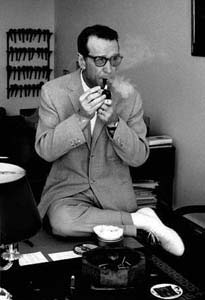
Georges Joseph Christian Simenon was a Belgian writer, most famous for his fictional detective Jules Maigret. One of the most popular authors of the 20th century, he published around 400 novels, 21 volumes of memoirs and many short stories, selling over 500 million copies.

Roubaix is a city in northern France, located in the Lille metropolitan area on the Belgian border. It is a historically mono-industrial commune in the Nord department, which grew rapidly in the 19th century from its textile industries, with most of the same characteristic features as those of English and American boom towns. This former new town has faced many challenges linked to deindustrialisation such as urban decay, with their related economic and social implications, since its major industries fell into decline by the middle of the 1970s. Located to the northeast of Lille, adjacent to Tourcoing, Roubaix is the chef-lieu of two cantons and the third largest city in the French region of Hauts-de-France ranked by population with nearly 99,000 inhabitants.
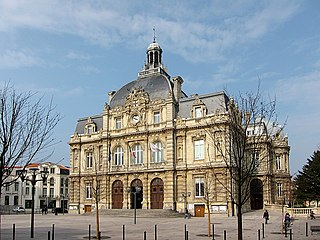
Tourcoing is a city in northern France on the Belgian border. It is designated municipally as a commune within the department of Nord. Located to the north-northeast of Lille, adjacent to Roubaix, Tourcoing is the chef-lieu of two cantons and the fourth largest city in the French region of Hauts-de-France ranked by population with about 97,000 inhabitants.
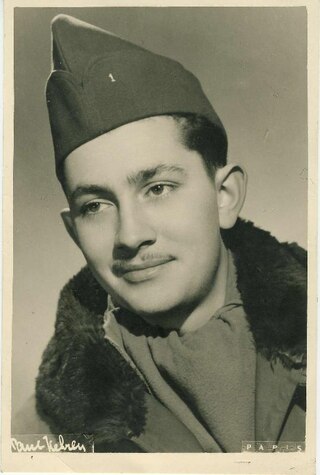
Jean-Claude Villeminot, better known as Jean-Claude Pascal, was a French comedian, actor, singer and writer.
The history of French animation is one of the longest in the world, as France has created some of the earliest animated films dating back to the late 19th century, and invented many of the foundational technologies of early animation.

Michel Simon was a Swiss-French actor. He appeared in many notable French films, including La Chienne (1931), Boudu Saved from Drowning (1932), L'Atalante (1934), Port of Shadows (1938), The Head (1959), and The Train (1964).
Louis Pauwels was a French journalist and writer.
Marcel Raymond was a Swiss literary critic who specialized in French literature. He is generally grouped with the so-called "Geneva School".

Baroness Suzanne Lilar was a Flemish Belgian essayist, novelist, and playwright writing in French. She was the wife of the Belgian Minister of Justice Albert Lilar and mother of the writer Françoise Mallet-Joris and the art historian Marie Fredericq-Lilar.
Frédéric Devreese was a Belgian composer of mostly orchestral, chamber and piano works that have been performed throughout the world; he was also active as a conductor. Devreese is known for his film scores, including Benvenuta by André Delvaux and The Cruel Embrace by Marion Hänsel.

The Diocese of Versailles is a Latin diocese of the Catholic Church, in France. The diocese, headed by the Bishop of Versailles, was established in 1801. Until then, its territory had mostly been part of the Archdiocese of Paris and the Diocese of Chartres. It was centred on Versailles.
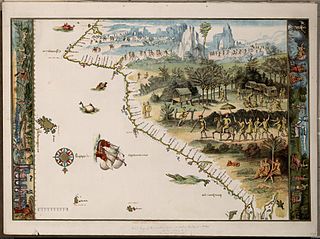
La grande isle de Java was, according to Marco Polo, the largest island in the world; his Java Minor was the actual island of Sumatra, which takes its name from the city of Samudera situated on its northern coast.
Jean Lartéguy was the pen name of Jean Pierre Lucien Osty, a French writer, journalist, and former soldier.
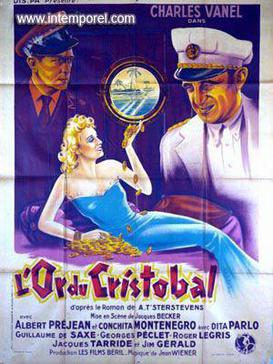
Cristobal's Gold is a 1940 French drama film directed by Jean Stelli and Jacques Becker and starring Charles Vanel, Conchita Montenegro and Albert Préjean. Jean Renoir helped the original director, Jacques Becker, prepare the film and worked on the script, before Becker quit after three weeks and was replaced by Jean Stelli. The film is based on a novel by Albert t'Serstevens. It was shot at the Boulogne Studios in Paris and the Victorine Studios in Nice with location shooting taking place around Villefranche-sur-Mer. The film's sets were designed by the art director Eugène Lourié.
The Prix Victor-Rossel is a literary award in Belgium that was first awarded in 1938. The award was created by three people associated with the newspaper Le Soir: the owner Marie-Thérèse Rossel, the manager Lucien Fuss and the editor-in-chief, Charles Breisdorff.
The grand prix de littérature de la SGDL is a French literary prize created by the Société des gens de lettres in 1947 in order to reward an author for the whole of his work, and which is given during the spring session of the society.
Michèle Pirazzoli-t'Serstevens (1934–2018) was a French archaeologist and art historian, specializing in the material culture of early China.